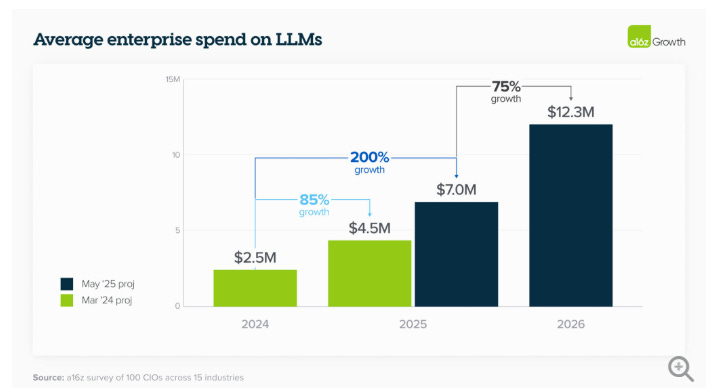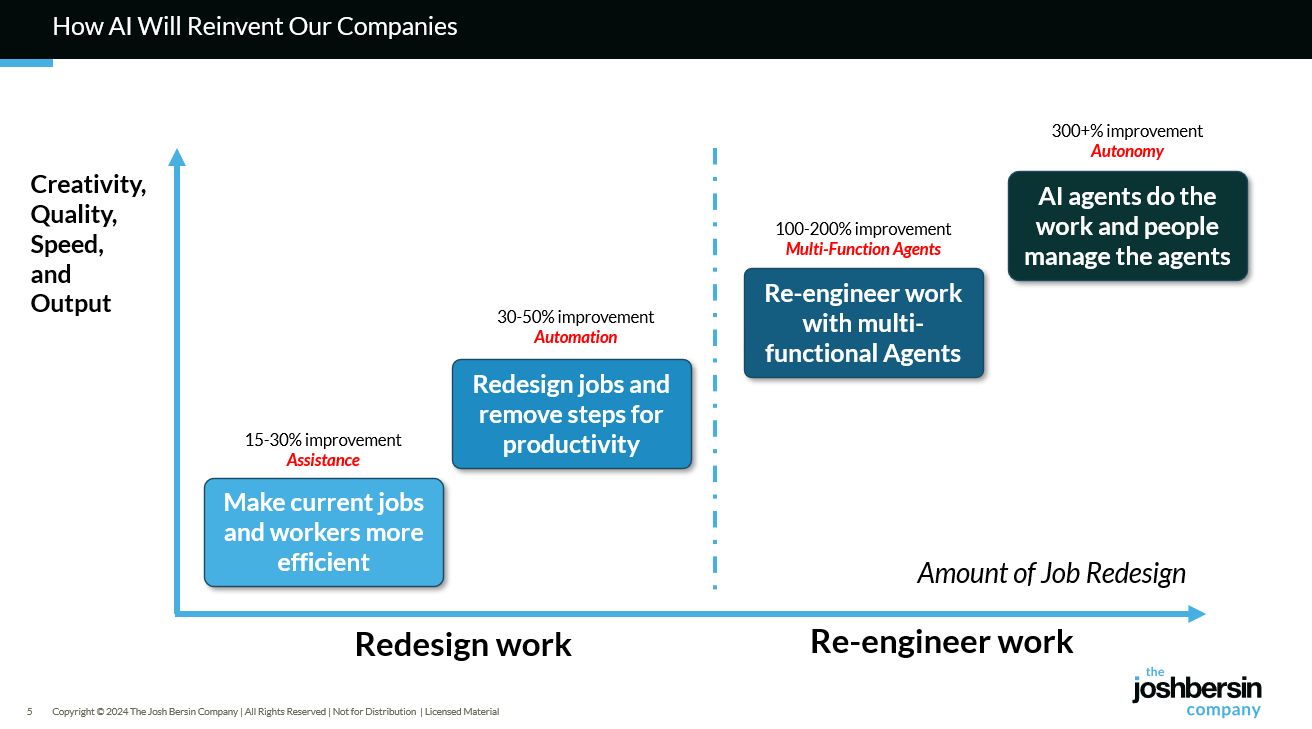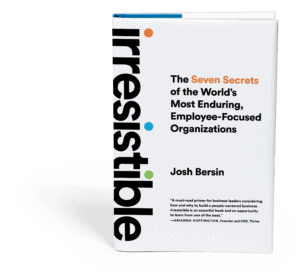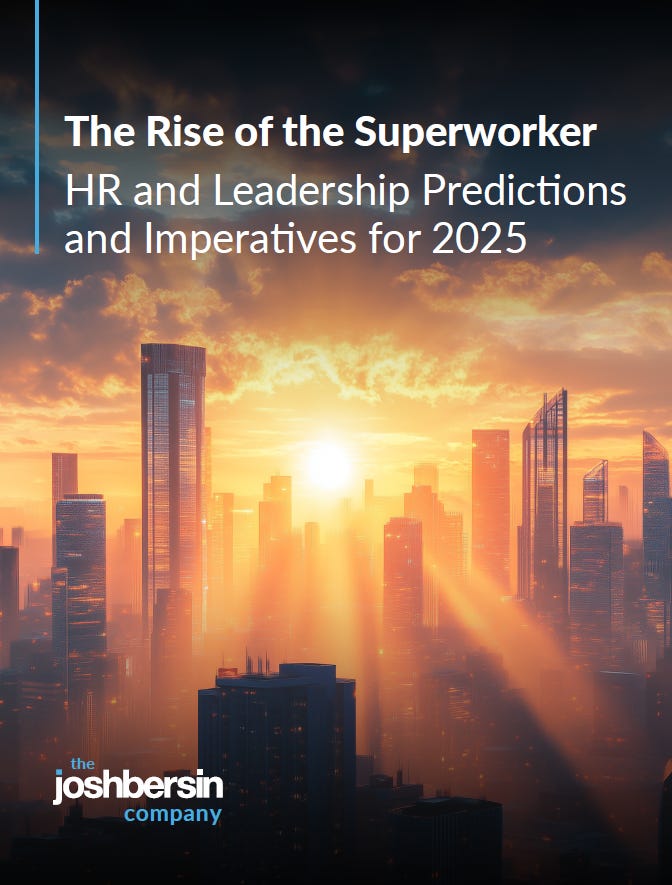Why AI Harm To Jobs and Humanity are Vastly Over-Hyped
I’m continuously surprised by the hyperbolic articles and comments about AI ruining the job market, the web, or our lives. Yuval Noah Harari believes this is an existential change to humanity. Mark Benioff claims that 30-50% of Salesforce ops is now done by AI. And media sites like The Verge (Nilay Patel) worry that all their Google web traffic will go away.
While nobody can predict the future, I do talk with hundreds of companies each month and probably meet with 5 or more software vendors each week, so I have a good sense of what’s going on. And as I describe in “The Rise of The Superworker,” many of these fears are unfounded. By contrast, I’m firmly convinced that AI tools and platforms are going to unleash personal creativity, business growth, and innovation.
And this will create many jobs, lift wages, and improve our working lives (and businesses).
Here’s my argument, largely based on our own experiences with Galileo (our AI platform) and many corporate and vendor clients.
First, the widespread “wipeout” of white collar jobs is simply not yet happening.
Yes, there is some softness in hiring, but this is largely because IT budgets are up 62% and CEOs are forcing business leaders to “adopt” AI. This push-effect has slowed hiring and almost all the companies I talk with are trying to figure out how to reorganize jobs and roles to improve automation for white-collar jobs.

I talk with senior HR leaders every day and there is a unanimous story: the CEO and CFO have mandated a shift to AI so “stop hiring workers and get going implementing AI.” So hiring budgets are frozen.
While the push makes sense, much of this has not worked out yet, simply because the off the shelf tools (MS Copilot, SAP Joule, ChatGPT) are not yet built out into complete applications. So at this point it’s not completely clear what jobs to change, what routine work to eliminate, and what AI to buy (or build).
(Read my article about Job Redesign for more, or listen to my podcast about WPP’s massive organizational redesign.)
If you look at our four-stage AI transformation model, my guess is that 60% of companies are at stage 1, 30% at stage 2, and 10% or fewer at stage 3 (within different business functions). I know, for example, that Chipotle is using Paradox to implement a Stage 3 approach to recruiting, (as is H&M with Maki People), and our own HR Academy is now at Stage 3 using Galileo Learn.

But generally speaking, it’s not clear that sales automation, lead gen (I’m getting so many junk emails from “Agents” now it’s becoming a massive turnoff from those providers), contract management, marketing (our Hubspot system is not as “intelligent” as we’d like yet), procurement, A/R, are here yet. It’s coming, but not at all mature.
I’d love to see Marc Benioff in his next financial analyst call, actually explain how much money he’s changed an list the “50% of jobs” he’s automated. I doubt he will. (Salesforce’s organic revenue growth is around 8% and its employee count, according to LinkedIn, is growing at 4%. So the company is becoming very slightly more productive but nothing like Benioff seems to claim.)
So while all these promises are coming, the actual details behind all these business processes are quite complex (and personal to each company), so there is a 1-2 year “development cycle” yet to happen.
Last week, for example, I was in the Middle East and met with many companies including one of the largest airlines. The HR team there was just starting a major re-engineering look at their HR processes and while the vision was becoming clear, we realized that most of the “products” they need are not here yet. They’re doing the redesign, and now looking for AI solutions.
This, by the way, is why I think most of the corporate AI re-engineering will be internally built, in partnership with vendors. We’re done with the “buy Workday and turn it on” approach to business software and automation – these AI agents will be infinitely configurable so companies have to have a sense of what they want to do.
It’s coming for sure, but not at all here yet.
Second, for each “agent” we use, many new jobs are created.
We’ve now seen more than 4,000 people buy and “turn on” our own Galileo agent, for example. Every single one of these users has come back with new “work” to do (finding data, cleaning up processes, etc.) because routine, mind-numbing work went away. This is the “Superworker” effect.
It’s kind of like what happens when you buy a leaf-blower: the leaves don’t “go away” and you don’t throw away your broom. It just lets you blow the leaves 10X faster, but then you have to bag them and put them on the street for recycling. Now recyclers get more leaves, you get to trim the hedges (another job for a robot), and the leaf-blower company makes more money.
In other words, automation of one task leads all of us to do higher level things, and this is going to continue forever. In other words, we become “Superworkers,” upgrading our value to our jobs and our companies. And “managing” these tools also takes time (learning prompts, finding quality data, iterating, training, and securing systems).
This week I saw another new AI tool that does FP&A (finance, planning, and administration). This is something every company needs, yet the old tools are so manual they’re almost a nightmare to use. This new system (I’ll tell you more when it’s launched) looks at your financials, CRM, and HRMS and “finds and shows you” profit gaps, slowdowns, and budget over-runs automatically. This takes me and our CFO hours to do by hand.
This Superworker effect is taking place now: the US unemployment rate remains very low (4.2%) and as I discussed in my recent article about entry level work, the “job market” is dealing with a few hiccups but there will be white collar jobs for decades to come. We’re just in a transition period.
I’m guessing that when the “web” started (around 1998) people expected “books” to go away. (And retail stores.) Well what happened was precisely what happens here: book writers and retailers “evolved” to use, leverage, and exploit the web. Now, 27 years later, we use the “web” for all sorts of advanced hybrid solutions (Substack itself for example, and hybrid e-commerce and mobile ordering), which just forced book writers and retailers to adapt. (And to my knowledge book publishing is flourishing.)
Writing a book is still a worthwhile endeavor, but many “writers” would now prefer to build Substacks and generate an audience without being held hostage to Amazon. Another Superworker effect. (Once you think about it you’ll see it everywhere.)
This “creative re-engineering” of our work, jobs, and lives will continue at an accelerating rate. I tell our clients that “you’re all developers now!” Just use the english language (or your own) and learn how to “program and automate” your own work, live, and business.
Third, AI is not quite as “smart” as AI engineers believe.
Despite the fascination with AI SuperIntelligence and other GAI models, the human genome is 1000X more sophisticated than the advanced mathematics inherent to AI. Our genome is the epigenetic result of millions of years of evolution, and this is why human beings are so empathetic, creative, passionate, and often unpredictable.
(70 Trillion combinations of proteins make up our DNA, and each cell type is different. That DNA encodes millions of years of learning, evolution, environment, and experiences. And some scientists think it’s infinite. Take THAT Nvidia!)
These “human” skills of perception, empathy, creativity, ambition, passion, grit, and innovation are nowhere to be found in AI. AI is a very powerful “analytic” engine and yes, it will learn more and more from our experiences.
Yes, Meta just announced its “Superintelligence Lab,” but let’s be honest. This is all about selling advertisements (and maybe creating romance bots). Is that going to change our businesses? Other than pinpointing even more advertising (now you could presumably by an ad for “people who are anxious about dating older women”), I doubt it.
In another vein, I am excited about “physical AI”, the decoding of physics, light, momentum, and other physical aspects of life, desperately needed for autonomous vehicles and humanoid robots (and war). I saw a demo in the Middle East of a network of Boston Dynamics crawlers (they’re definitely creepy) all programmed to monitor and support safety in oil refineries.
(Just today at the gym I was talking with my trainer about the robots that could clean up the 100 pound weights people keep leaving on the floor.)
I worked in a refinery early in my career and one year we had a sulphur dioxide leak which killed a refinery operator. That horrible experience alone would easily justify a multi-million dollar robot monitoring system, which I’d imagine is now rolling out in many plants, chemical facilities, and energy companies. (I also visited several nuclear plants early in my career and I was always creeped out when I was told “don’t get any closer to that valve because it’s highly radioactive” when you can’t see or feel anything!)
So there are thousands of amazing use-cases for AI. But does that mean the autonomous car or refinery robot is “feeling” or “understanding” the nuances of the road, plant, or weather? Sure over time all those signals will be coded, but we humans are so much more adaptable and we will always “rise above” these machines.
And that leads me to my fourth point.
Fourth, it’s humans who create new ideas, businesses, and industries.
Remember also that it’s people who “think up” the new business models, innovations, products, and services that drive value. If AI were so “smart,” why wouldn’t it start it’s own company? 🙂
Every breakthrough product, science, company, or idea comes from a human being. We humans are wired as “learning animals” (starting from birth), and our complex instincts of survival, fear, learning, ego, empathy, patience, forgiveness, and triumph are what makes us all entrepreneurs, creators, caretakers, or even politicians. This complex tapestry of “intelligences” is what builds companies like Apple, Microsoft, Nike, and Disney. Behind each of these amazing businesses was a person (or a few people) who “thought up” something new that was missing and badly needed in the world.
In the case of AI, we’re all going to have automation agents. It’s tantalizingly easy to buy a bot and use it or “turn it on” for routine work. (We automated our editing and transcription process in a few days.) But how we are pivoting our business toward “intelligent HR and talent solutions” with our Galileo platform was a human idea, incubated in my head, and curated through the work of our management team and our partners.
And this “human intelligence” thrives under stress. Look at the creativity of the Ukranian military. Look at how quickly we adapted to the pandemic. Look at how people with chronic disease and disabilities learn to adapt. There’s something mystical in our human intelligence, and ideas like “Morality” are fully human. Lord Jonathan Sacks, the chief Rabbi of the UK, wrote about it eloquently in his wonderful and famous book.
 I call this “the Unquenchable Power of the Human Spirit,” and I see it again and again in our clients. When times are tough or uncertain (witness the pandemic), human beings adapt, learn, and pull together in teams in subtle human ways. I have no evidence that AI has this type of historic intelligence.
I call this “the Unquenchable Power of the Human Spirit,” and I see it again and again in our clients. When times are tough or uncertain (witness the pandemic), human beings adapt, learn, and pull together in teams in subtle human ways. I have no evidence that AI has this type of historic intelligence.
I was talking with the CTO of Sana, our partners in Galileo, about this, and he agreed with me that AI does not understand “history” and the cause and effects of time-based learning. I’ll write more about this as I talk with more scientists, but I still believe that we, the humans, are far more adaptable and “learning agile” than these data systems.
Bottom Line: Our Jobs and Lives are Safe
The bottom line for me is this: AI is a tool. We can make it or teach it to do whatever we want. If we let it get away from is it may hurt us (as will a lawnmower or a power saw). It’s up to us, as high-level thinking humans, to simply learn about this tool, understand how to use it, and apply it to our jobs, companies, and lives.
Life will go on, economies will continue to be driven by emotion, and our businesses will continue to be fueled by human ideas, emotion, grit, and hard work.
Additional Information
Get Galileo, The AI Agent Designed Exclusively for HR and Leadership

